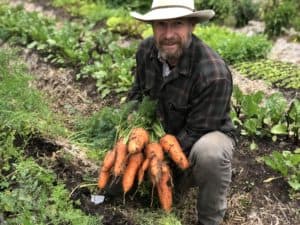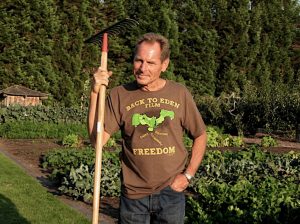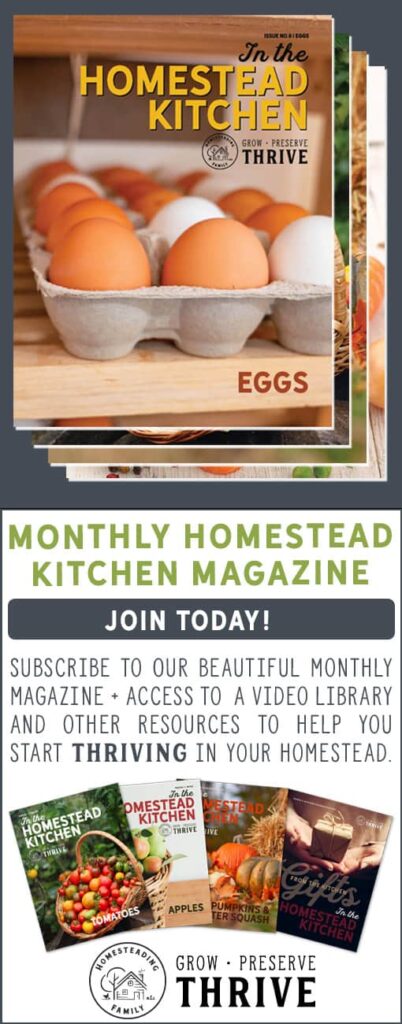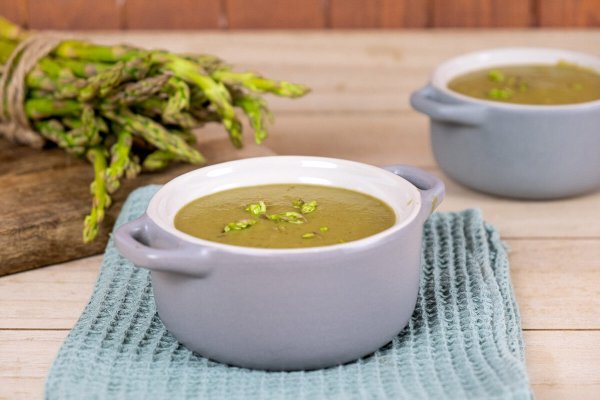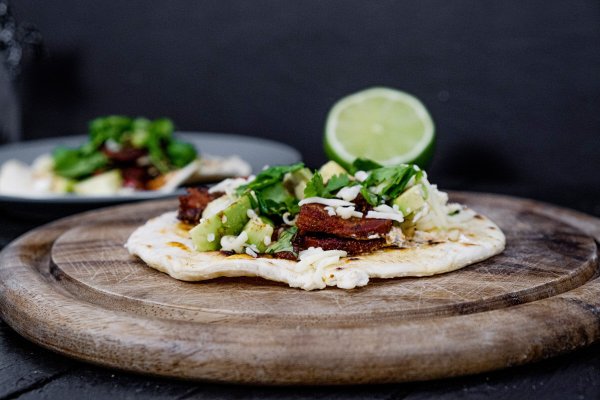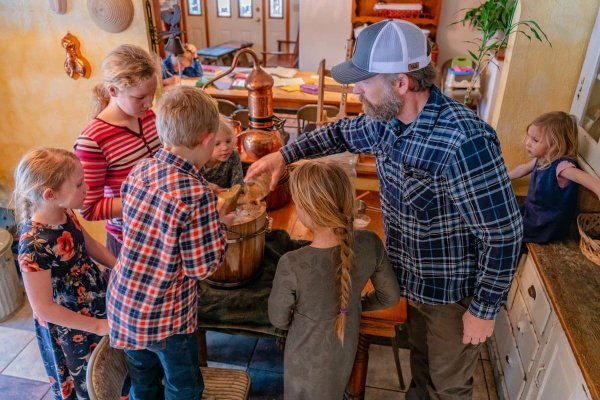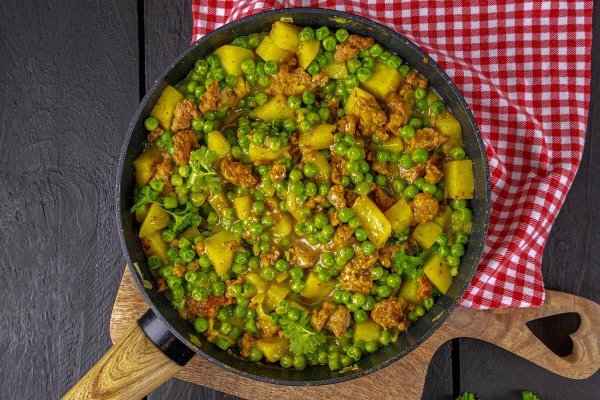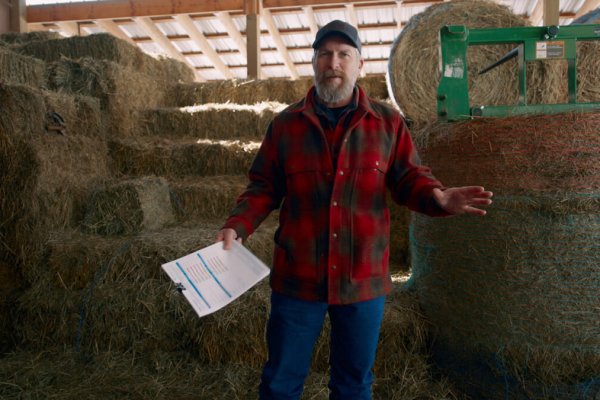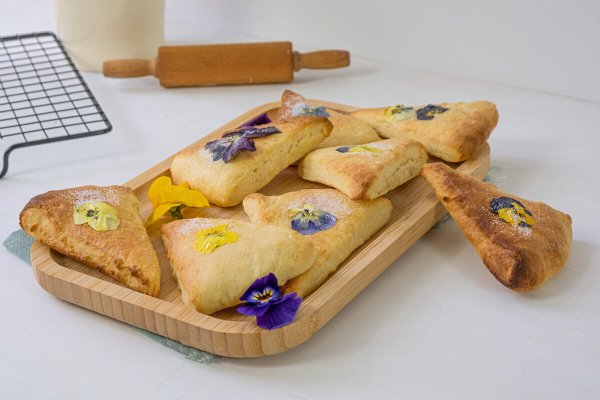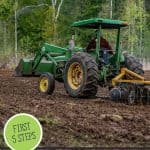
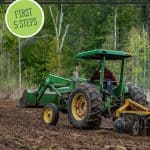
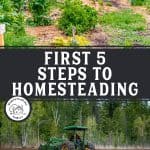
When you’re ready to start taking your homesteading journey seriously and begin increasing your self-sufficiency, there are certain skills you really need to learn first. Here are the first five steps to start your homesteading journey.
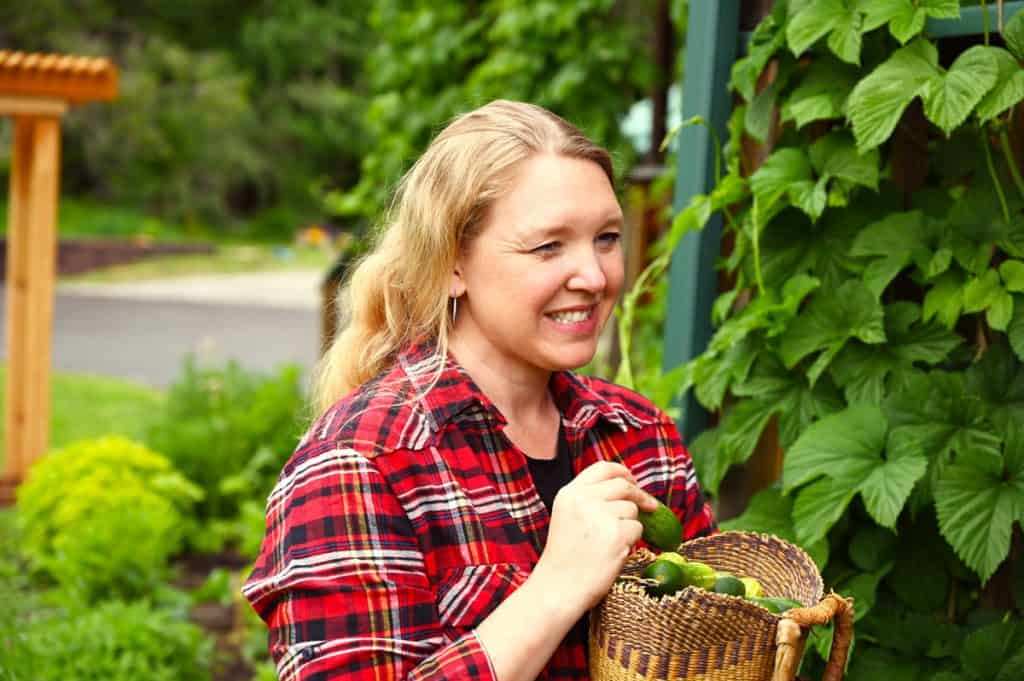
Why We Chose Homesteading
After being married for a few years and as we started having children, we knew we wanted to start building the skills and infrastructures to be able to live a more self-sufficient life.
We realized homesteading wouldn’t just “happen” overnight, but there were some basic skills we needed to learn and implement in order to be successful with our homestead journey.
Creating a homesteading lifestyle doesn’t mean having to make a giant leap out to the country. Whether you’re in the suburbs or even a one-bedroom apartment in the city, you can start your homesteading journey today by applying these key principles and begin making the mind shift from a “consumer” to a “producer”.
You can hear more about our homestead journey, going from an apartment to 40 acres, the 10 things I wish I knew before I started homesteading, how homesteading can improve your health and, in the podcast episode below, we talk about the 7 essential skills you need to start mastering now before you can take your homesteading journey to the next level.
But for the rest of this post, we’re going to focus on the first FIVE things you should do.
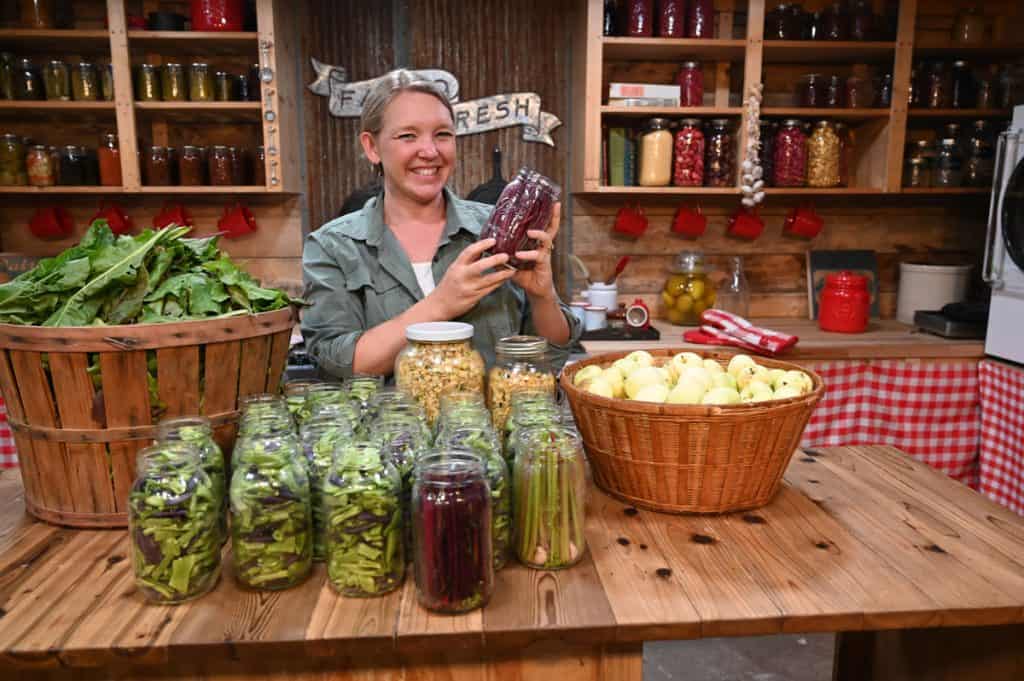
Must-Have Skills for Homesteading
Time Management
The first skill you need to master as a homesteader is time management. I have discussed my own time-management tips in detail here.
Remember, homesteading is like a part-time job. It takes many hours per week and you need to learn how to manage your time well.
It’s said that the average person watches three hours of television each day, which is as much as a part-time job! This is the time you’re going to need if you’re serious about homesteading.
My best tip is to start setting an alarm and getting up at a specific time each day. Then start tracking how you’re spending your time and make the decision to use your extra time productively.
Once you master time management, as well as the other skills listed below, you’ll be ready to jump into homesteading.
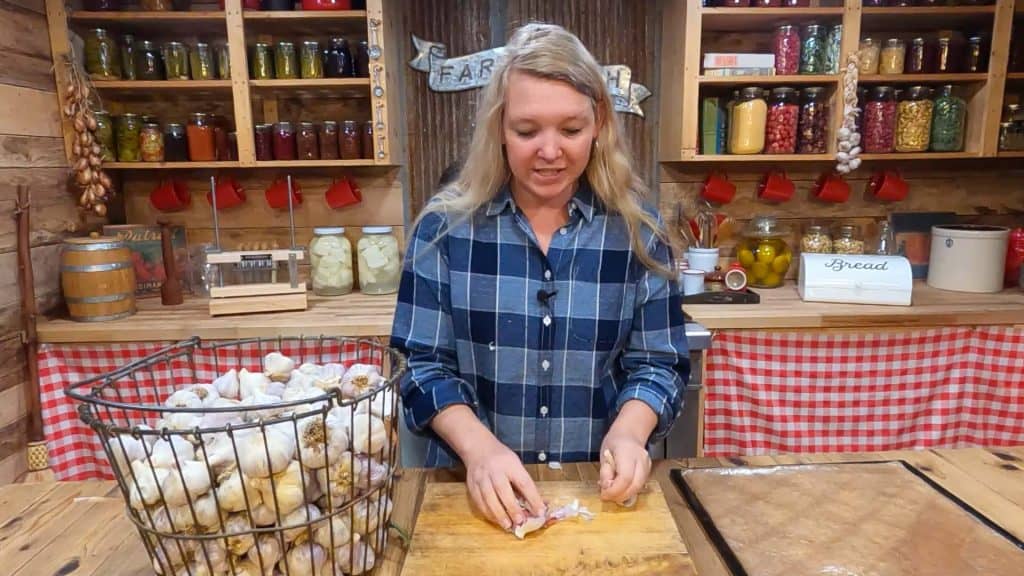
Cook From Scratch
If you don’t know how to cook with just plain old ingredients then you’re going to be in for a real shock when you start living on a homestead.
Start shopping on the exterior of the grocery store where foods don’t have ingredient lists, they are the ingredients. Learn the tips and tricks to cook efficiently with good quality ingredients to make delicious wholesome and simple meals.
Watch the video above to see how quickly and easily I chop an onion!
If you already know how to cook from scratch, then start making some items you may purchase from the grocery store on your own. We like to make homemade herbed garlic salt, DIY cooking spray, homemade bone broth, homemade pie crust, and our favorite no-knead five-minute bread.
Shop Locally
If you can skip the grocery store and begin sourcing and buying food and other goods locally this is even better. Shopping locally does so many great things for you and your community…
- It helps keep local businesses thriving
- You’ll be getting the freshest produce
- It’s going to help you make connections with local farmers
- And you’ll learn how to cook with the seasons based on what produce is available.
Get used to the idea of eating what’s fresh and in season! In the winter, these are items like root vegetables, parsnips, potatoes, onions, etc.
If you can go to a farm and shop directly from the farmer, this not only helps support local farms, but it will also likely save you some money!
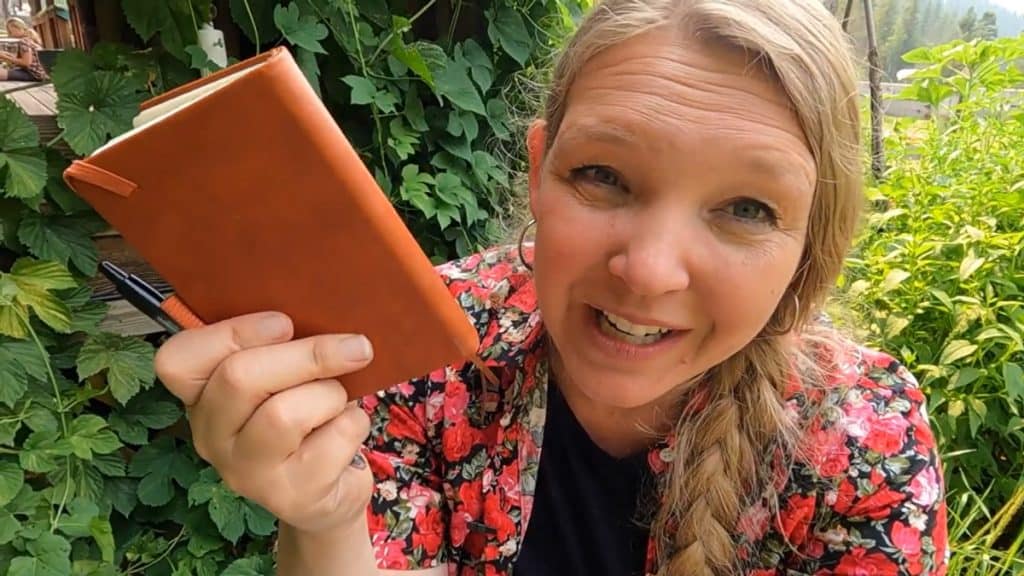
Get Rid of Consumer Debt
Debt always causes stress! Getting rid of debt is so freeing, not only for your mental capacity but also for your time.
Do whatever you can right now to pay off extra debt, even if that means picking up a side job, selling some items, or even saying no to extra purchases for a while.
If paying off your debt means you put off homesteading projects for a bit, just know it will be worth it to walk into the homesteading lifestyle debt-free.
Start by making a list of your debts and begin tackling them one by one. You might find it helpful to read Learning How to Homestead While on a Budget.
Once you can start homesteading, you’ll be paid back with dividends. Because not only will you be saving money on the food you produce, but you’ll be saving money on income taxes by not having to create the income it would take to buy that food.
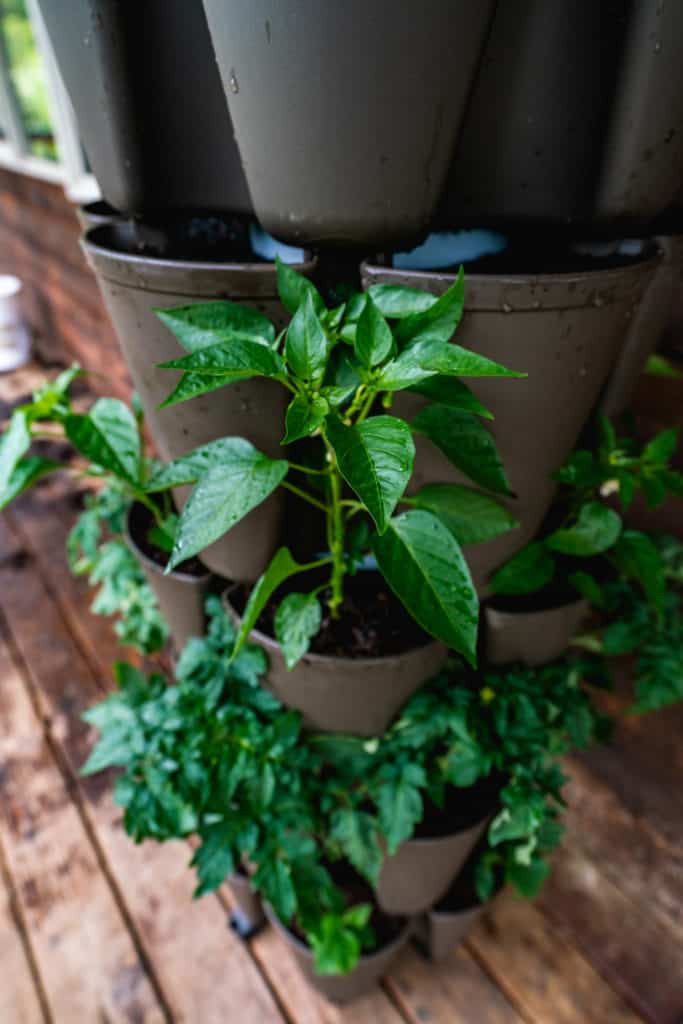
Start Growing Something
You don’t have to start growing a large vegetable garden in order to be a homesteader. Our recommendation is to start growing something! Even if it’s as simple as a houseplant, or taking some grocery store herbs, putting them in a jar of water, and keeping them growing on a sunny windowsill.
If you’re limited on space you can check out the Greenstalk Vertical garden system and see how we planted an instant salad garden in ours.
Or, if you have a small space in your yard, check out how we turned a patch of grass into an instant garden and grew enough lettuce to feed our family of 12.
Whatever you do, just start growing. There are so many great skills to be learned simply by keeping plants alive. Plus, here’s our list of homesteading essentials to help things run more efficiently.
What Is Homesteading?
Remember, homesteading is a state of mind, not a state of where you are. You don’t have to have 40 acres to be a homesteader.
It’s a choice that we make in all the little decisions throughout the day to be a producer and not just a consumer. To do things ourselves instead of relying on a purchased solution.
You can homestead wherever you are, start by learning the five steps above!
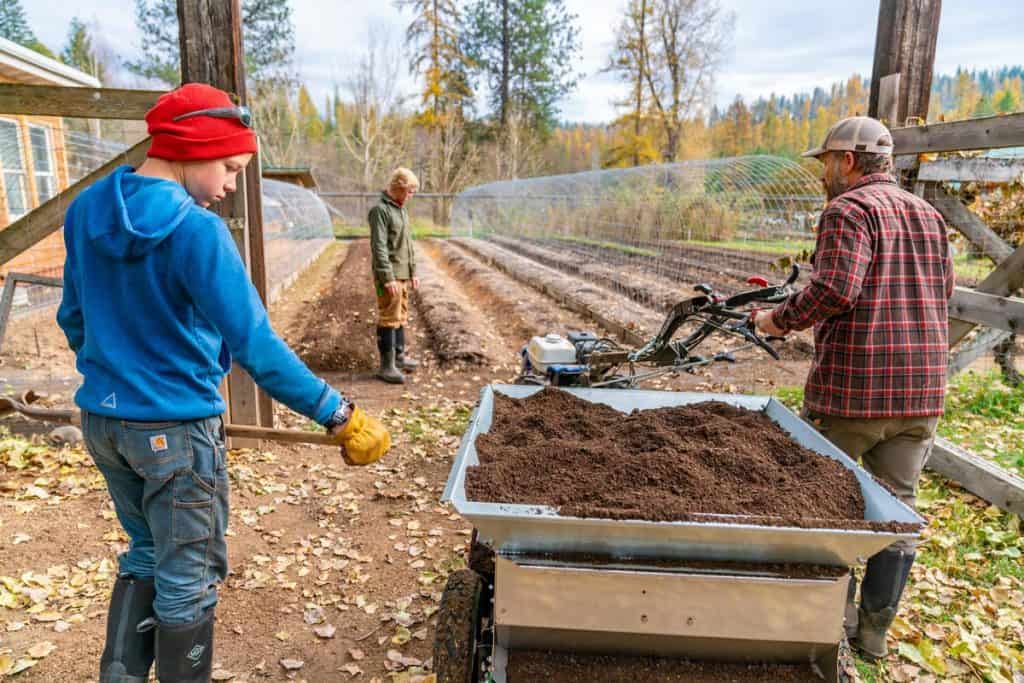
More Resources for the New Homesteader
- How to Finance Your Homestead
- Apartment to 40 Acres – Our Homesteading Journey
- 7 Reasons Why You Should Homestead This Year
- 8 Things You Need to Know When Buying Homestead Property
- How to Buy a Homestead – What To Know Before You Buy
- 7 Things You Must Do On Your New Homestead
- Good Enough is Perfect
- Organizing Your Property’s Permaculture Zones
Josh: Hey guys, this is Josh.
Carolyn: And Carolyn.
Josh: With Homesteading Family and welcome to this week's episode of the Pantry Chat's Food for Thought.
Carolyn: This week, we are going to be talking about how you start homesteading, the skills you need right now.
Josh: This week's episode of the Pantry Chat is brought to you by BCS Two-Wheel Tractors. Now you may have already heard of the legendary versatility of BCS two-wheel tractor for small farms and homesteads. We love ours here on Riverbend. It's the most efficient and time-saving choice for a small acreage, building raised beds with the rotary plow attachment, mixing in soil amendments with the power harrow and shredding cover crops in place with the flail mower. But a BCS two-wheel tractor is more than just a gardening tool. BCS powers more than 40 high quality PTO driven attachments, each with the power and performance of an all gear drive transmission. Blow snow with the BCS' snow thrower. Chip and shred limbs and sticks with the chipper shredder. Clean up your property with the pressure washer. Haul up to 1100 pounds, including yourself, with the ride on utility tractor and even spread compost over 30 inch beds with the spreader attachment.
Yep. BCS is pretty much the Swiss army knife of power equipment for your homestead. Check out bcsamerica.com to see the full range of tractors and attachments and find your nearest BCS dealer today. That's bcsamerica.com. Well, Hey, you guys welcome back to this episode of the Pantry Chat.
Carolyn: Yeah, this is going to be a fun one because we are going to be talking about getting started homesteading, which I know is on a lot of people's minds right now.
Josh: A lot of people are thinking about moving. We're seeing that a lot and growing more of your own food.
Carolyn: We're just doing more right where you're at. And I know between different world events, there have been a lot of food recalls lately. Have you caught that? Between the headlines of COVID and economic troubles and all the other things going on, there have been large, large food recalls. So this is a really good time to start thinking about growing more of your own food and starting some homesteading skills if you need them. So that's going to be what we're talking about.
Josh: Absolutely. And those are things that we're passionate about. So, hey, we want to welcome you back, if you're joining us on the podcast, this is the second episode of the Pantry Chat podcast, but we have been doing these series on YouTube for well over a year.
Carolyn: Yeah. So we have a year's worth of Pantry Chats on YouTube, but we're so excited that you are joining us if you're a podcast listener, yay, welcome.
Josh: Absolutely. And so to get this going, we usually, before we get into main topic, do a little catching up. What we like to call a little chit chat. We're going to answer one of your questions and then we'll get into the main body.
Carolyn: Okay.
Josh: So Carolyn, what's going on with you?
Carolyn: Wow. This has been a really busy week. We have a few neat things happening around here and some really big homesteading things happening around here. The first thing is the cucumbers.
Josh: Cucumbers are in.
Carolyn: It is cucumber season now officially. And there's a discussion out there. If you've ever made pickles, you'll know what the discussion around pickles are. Right? How to keep them crisp when you can them. So I've always just made what's essentially called a quick pickle where you just put your cucumbers in, you put your hot brine in the jar and you can them.
Josh: A quick pickle.
Carolyn: Like that. Okay. This year I have been doing a lot of research on different ways to pickle your cucumbers. And I'm really excited to be trying out some different methods. The first being fermenting your cucumbers first, so fermented pickle, and then canning them. Yes, you lose the benefit of the ferment, so we want to do some fermented pickles that are just fermented.
Josh: Those are awesome. Those are my favorite.
Carolyn: Those are delicious, but there are some benefits to having the canned cucumber pickles, which is one, they're going to stay the same after you can them. They don't continue to develop because there's a point where they just get too pickled when you ferment them. Right? But I just read a scientific study that they did and fermented cucumber pickles that are then canned actually stay crisp way longer than just freshly canned pickles. So I'm going to be trying that, but then I'm also going to be working on a other canning method that is called low temperature pasteurization. This is only approved as safe in certain cucumber pickle recipes. And you have to really watch it, but it's where you don't even ever bring your jars up to a boil. You hold them at 180 degrees for 30 minutes. So I'm really excited to be experimenting with some of these, kind of get our longterm favorite recipe for canning pickles.
Josh: Very exciting. I love her experiments. I'm usually the first one to get to try them. Most of the time that works out good. And I assume that once you get that dialed in, you're going to share that with the canning class.
Carolyn: Absolutely. Yes. I will be passing that along to the canning class.
Josh: Something out on YouTube.
Carolyn: Oh, and I'll definitely share what the best method was that I found here on YouTube and the podcast.
Josh: Very cool. Exciting stuff.
Carolyn: Yeah. But then in other news, we're having the county fair this week at our county. And so we have just turned in, I don't know, over a dozen different things. The kids have turned in over a dozen different entries from cut flowers to canned goods to produce out of the garden.
Josh: Personally, I love the Lego creations.
Carolyn: Lego creations. Yeah. That's a big one.
Josh: Some of the little guys, they had some pretty cool stuff going on there.
Carolyn: Judging was this afternoon. So we don't know who won yet, but we'll go find out. A lot of times we're bringing in some pretty cool ribbons around the house, but just participating is a lot of fun. So what about you? What have you been up to?
Josh: Wow, well, composting, getting ready and getting set up for a lot of bulk buying for our feed, which for us comes in large. We've got to get in about 10 to 15 tons of hay, several tons of feed. And we're just getting set up to do this at a new scale, which is really exciting. And just the way things are right now, that's particularly exciting. I'm very happy to just be stocking up, getting bulked up and getting, not just our own personal pantry, but the barn pantry for the animals in wintertime all stocked up. We're getting ready for that. A lot going on in the garden. It's August, it's hot. Making sure everything's well-watered, weeded, thinning.
Carolyn: Harvested.
Josh: Yeah. Well harvested, a lot of harvesting going on and trimming some trees. We have some disease issues on this property because of things that we inherited when we bought the property and trying to deal with those organically and naturally, and a lot of that is like really cutting back some trees.
Carolyn: Repeatedly cutting back some trees.
Josh: Repeatedly, along with building soil at the base level and cover crops and different things like that, which is all just kind of happening and good. I'm hoping we can save a few trees, but we'll see how it goes. It's a long process.
Carolyn: Yeah.
Josh: And yeah, that's keeping things busy.
Carolyn: It is.
Josh: Yeah. So, it's all good stuff. And we should probably-
Carolyn: Move on to the question of the week.
Josh: Jump into the question of the week, I guess you're [crosstalk 00:07:39].
Carolyn: I'm going to ask you this question. I really laughed when I saw this question, I got to say.
Josh: Yeah, I did, too.
Carolyn: Mary Coffin from one of the last Pantry Chats asked, "Just out of morbid curiosity, why don't we ever see Josh without a hat anymore? Do you have any hair left under there?"
Josh: I'm going bald.
Carolyn: Are you going to take your hat off so we know what's going on?
Josh: The reality is, is hats are like trailers and jackets.
Carolyn: Right.
Josh: You can't have enough of them.
Carolyn: Okay.
Josh: Okay?
Carolyn: Uh-huh (affirmative).
Josh: Okay?
Carolyn: Okay, and?
Josh: And I haven't cut my hair in a long time and I've been too busy to comb it. I still got it.
Carolyn: So we still have hair. There's still hair there. It's just the problem is we have too much hair at the moment.
Josh: Right. Yeah.
Carolyn: We've got a whole bunch of kids who are wearing hats too.
Josh: The guys all need haircuts. And that's my job.
Carolyn: Yeah.
Josh: We cut.
Carolyn: I used to do it.
Josh: We cut hair in home, but you've got a lot to take care of, so I took over that to help out. And so now I've got, what, four, five, including myself, guys to cut hair. And so carving out time for that gets challenging. So yeah, we're a little shaggy right now, but that's okay. We'll get there soon.
Carolyn: All right. Well, thanks for the laugh, Mary. It's a good question.
Josh: Absolutely. All right. You ready to dive in here?
Carolyn: We're going to dive right in.
Josh: Cool. Okay. Today's topic, how to start homesteading, the skills you need right now. And what we're talking about is right where you're at before you've gotten to the homestead, the things you need to be doing, or if you're just there and you're just learning and getting going, you just bought a piece of property. But if you have, backup a little bit and check this out, because there are skills you need to build before you go on to maybe more developed stages and projects.
Carolyn: Right. I think there's this real myth in homesteading that you need acres of land in order to homestead. But really homesteading is a real mindset about being more engaged in what you're doing.
Josh: That's true, the way we approach it.
Carolyn: Yeah. And thinking through the skills that you need and learning the skills that you need to be more productive in your own home, become a producer rather than a consumer. And you can do that wherever you're at. You can do that in a apartment, second story apartment, where you have no ground. You can do that in a city lot. You can do it out on 40 acres of land. And so this is about the things that you can do right now, right where you're at, wherever that is, to start learning the skills that then you can use wherever you are, whether you go onto a large piece of land or you stay right where you're at in the city.
Josh: And I really want to reinforce that thought that you brought out about switching from a consumer to a producer. That's really what the homesteading life is all about. However we're doing it, you were really focusing on switching from being a consumer to producer, and that is a mindset change. So the things that we're going to talk about today are really skills that you can do wherever you're at right now that are going to help you build skills, but more importantly, a mindset that helps you shift from being basically consumer focused to producer focused.
Carolyn: Good. Yeah, absolutely. Okay. So we've got quite a list of them, so we better start getting through them, okay?
Josh: Sounds good. Well, number one, on the top of the list that you can do right now, cooking from scratch.
Carolyn: This is so important. You need to learn how to cook without boxes of anything, without pre-made anything. You want to be cooking from things that don't have an ingredient list written on them, whole vegetables, whole grains, plain meat. Things like that are going to really one, they're going to give you the best health return out of your food. But two, they're also going to save you a lot of money while giving you the skills that you're going to need for all sorts of other skills that come later, like food preservation, even soap making and things like that. If you know the basics of cooking from scratch in your own kitchen, you can follow those recipes just fine. So this is a really, really foundational and important skill to start with. Learn how to cook from scratch and learn how to get your convenience foods from scratch too, which means thinking ahead, of putting something extra in your freezer, whatever it is to be thinking ahead and have what you need from scratch. Right. Right. And everybody can do that right now.
Josh: Well, and to boil that down, the reality is, is you want to grow a bunch of food in your garden. You want to raise a bunch of animals, have fruit trees, whatever it is, that's raw food. You need to know how to put all of that together.
Carolyn: Right.
Josh: And that's a skill to build. Right. Very important skill. Okay. You can do that right where you're at. All right. Next one. Number two, bulk buying.
Carolyn: Yeah. This is another really good one because you are going to start saving money, but you can also, when you start moving to those real ingredients, those from scratch ingredients, you find that a lot of things are all made from the same set of basic food groups. Right? So if you buy a large amount of wheat bulk, you've got your bulgur wheat, you've got your cracked wheat, you've got flour, you've got coarse flour, you've got whole wheat. You can sift it out to make a white flour. You actually have a whole lot of products, all in one thing. So you get to simplify your pantry in some ways, but you also save a lot of money by buying bulk, but you also are creating a backup store of food at the same time.
Josh: Right. And by bulk buying, you're mimicking what's going to happen on the homestead.
Carolyn: Yeah.
Josh: Because one, there's some things you just need to buy in bulk. You're not going to raise it on the homestead. Two, you're going to bring in a lot of things that are going to come in in bulk, whether that is processing a large animal, whether that is a large harvest of potatoes or carrots or green beans. Yes, you're going to have your fresh harvest hopefully throughout the season, but you're going to be bringing things in bulk. And so that bulk buying before you've even gotten to that time is helping you build those skills of storing, working with, using all of those items that you're eventually going to be producing for yourself on the homestead.
Carolyn: Absolutely. So you can see how foundational these early skills are because they just give you the ability to learn the later skills much more quickly.
Josh: And they're also, I don't remember if you said it here, but they're also very economic.
Carolyn: Yes.
Josh: You're working on a different scale. It's training you to think in that cycle, but by doing that, you're also saving money.
Carolyn: Yes.
Josh: And that's very important to have that mindset within the homesteading paradigm as well.
Carolyn: Now I've seen a lot of skills lists about homesteading before, and this is one that I don't think I've ever seen on a skill list, but it's so important, I can't believe it's not on there. And this is number three for us. And that is pantry management. Once you have all that food in your house that you're bulk buying and you're buying these fresh ingredients, you need to learn how to manage your pantry. And this is a skill that was just inherent in earlier generations and times.
Josh: Right.
Carolyn: But nowadays we kind of have lived for a couple of generations on this just go to a store and grab it when you need it and let it run out on your shelves.
Josh: Right.
Carolyn: And that just can't be how you live, if you want to live economically, you want to bulk buy, you want to make sure you have your backup foods. You need to be bringing those foods in large amount, but then you have to manage them once they're in there, you have to make sure you're using the oldest first. You have to be looking and going, "What do I have too much of? What do I not have enough of?" And that needs to always be a question in the mind of a homesteader, but as certainly the one who's managing the kitchen and the pantry, right? If you're like us, you're working with somebody else. You're working with your spouse. You might have divided areas that you're working on.
So for me, that's a big area that I work on is making sure I know when I have all those potatoes in storage, if those start going soft, I've got to pay attention to that and get those heavily into the meal plan or figure out how to preserve them a different way. So pantry management becomes a huge skill right along with preserving your food, which is the next one.
Josh: Right.
Carolyn: Yeah. So food preserving is where we're going to be dehydrating, fermenting, canning, pressure canning, and getting all those bulk buys, especially of the fresh items, into a shelf stable form. So we do a lot of that around here. We do a lot of canning and fermenting and definitely some dehydrating. And that just helps us to get that food in a place where we can use it all winter for us when we've brought it in. That is so important because again, these first four skills just create this basis. When you have these, you're going to save a lot of money, right?
Josh: Absolutely.
Carolyn: So when you're looking ahead to doing other homestead skills, building other things, you can save a lot of money by starting these first and be able to set aside money to be able to tackle more expensive projects later.
Josh: Right. So which of those would be the one to tackle first?
Carolyn: Of the different preserving methods?
Josh: Of these four.
Carolyn: Of these four.
Josh: You've got three here fermenting, water bath canning and pressure canning. There's a lot more.
Carolyn: I mentioned dehydrating there, too.
Josh: So which one, if you're starting from very scratch, you're doing some of this stuff, but you want to start learning preserving, what do you think is the best skill to start with?
Carolyn: I think fermenting, honestly, is one of the best and the reason is it's very, very safe. Fermenting vegetables is incredibly safe. There are a lot of safety things you have to learn about both water bath canning and pressure canning. But fermenting vegetables is very safe. It's kind of hip right now. So you can impress your friends too, but it's a really good place to start, I think. And then moving on to water bath canning, pressure canning, dehydrating, those all take a little bit more learning. So you have to do some studying on those things.
Josh: Yeah. Very cool. Well, moving on, we've got a list here. Number five, working together. So this is going into a different vein here, but learning to work together. Self-sufficiency is a myth.
Carolyn: Yes.
Josh: It's a term we use and we understand it to mean something, but self-sufficiency is really a myth. It takes a team, it takes at least two and generally it's going to be a family and probably even out into a community and the skills we need to start building, learning how to work with each other and work with people, doing all of these things.
Carolyn: If we could replace that term self-sufficiency with a term like community sufficiency, I would be totally happy because you don't want to be in a position where you're the only person you can depend on.
Josh: Because you cannot produce everything for yourself.
Carolyn: Yeah.
Josh: It's just not possible, nor would it be enjoyable because you would not do anything else in your life, trying [crosstalk 00:18:37]. And that's a skill. Within this realm of skills, that is a skill to learn to work together. And especially as a family, as a family unit, learning to work together and work with kids and make that transition from maybe a life where mom and dad are going to work in different places. Maybe mom's at home, dad's at work, kids are doing different things. And all of a sudden, you're all starting to team up on something. That's a skill to build that you can start on right now doing projects together.
Carolyn: So I think there's almost two parts of that, honestly, because you have this broader sense of we have to learn how to work together, to accomplish a goal together and there's kind of relationship building in that. But I got to say, the hardest part of this that I found is to learn how to work together and talk and have fun while continuing to work. It's not a skill that we develop in the modern world.
Josh: It's certainly not, it's not natural to me. I like to work and I'm a focused worker and I grew up alone. So I'm very used to just getting focused and not necessarily communicating a whole lot outside of whatever's work-related while I'm doing a task. And then I know I've talked a lot of people that feel very much that way. That is a skill to learn.
Carolyn: Yeah. Well, and I realized that about myself too, is because a lot of times I'll stop working so I can talk, but then I'm not getting the work done and I have to be getting the work done. And so you learn by practicing really. And for me, when I've had friends in my home, who've come to work with me, I have to say, "I'm not very good at working and talking at the same time. So if you lose me for a second, don't be offended because it's just that I have to pay attention to this." And I think giving that disclaimer, as I'm working, makes me feel a little less self-conscious that I'm not looking at the person in the eyes while I'm also chopping vegetables. So, it's like you have to kind of say that, but it's a huge skill to learn. And it's a really valuable one to learn because then you can work with people, getting things done faster, but you enjoy your time better because you're visiting and talking.
Josh: Absolutely. All right. Number six. And this seems obvious, but there's a few things to say about this and that is gardening. I mean more than likely or not, you're going out to homestead, you are going to garden. You're going to grow some food for yourself. But here's the deal. We hear so many stories about people that are going to go or going and buying a big piece of property, they've never gardened before or done very little and they're going to go put in a giant garden and grow all their food for themselves.
Carolyn: Right.
Josh: Folks, that's not usually the way it works.
Carolyn: No, it doesn't.
Josh: It is a skill to build and start where you're at. If you are in an urban lot or an apartment, if you've got a little bit of sunlight, there are great vertical garden systems that you can use. A lot of times there's community gardens these days. Those are everywhere and you need to start small and start building up to that skill to get to the skill where you can garden a large plot.
Carolyn: It takes years to learn the skill of gardening.
Josh: It does.
Carolyn: It really does. And so even if all you're doing is starting with those little enclosed units on a counter that has some herbs in it and a built-in light, that's a great way to start if that's all you have, but do what you can, right where you're at, because just your experience with that small amount is going to help you a lot when you get to the next level. So everywhere you go, just size up, grow into the space that you have available to you.
Josh: Very good. All right. Moving on to number seven.
Carolyn: This is a good one.
Josh: Fixing things yourself.
Carolyn: Yeah. This would include mending for clothing. That is a skill to learn.
Josh: And you're going to beat up your clothes. So you don't want to have to be buying new clothes just to go out into the garden or crawl under the truck or weed whack or whatever it is you got to do. Carolyn has been awesome at that over the years.
Carolyn: Especially when you have children involved. There's a reason when you go to thrift stores that there aren't little boy jeans in sizes like five, six and seven, because they're completely destroyed. The knees are gone, right? So you need to be ready to mend those things to make them last. That's part of being frugal, but it's also part of just doing the best you can with what you have right now. And that's true of other things on the homestead, too.
Josh: Absolutely. Machinery, appliances. You don't have to do everything. And there's just a time where it makes sense to go hire it out, get it repaired because your time is better spent, but there's a lot of things that you need to just be able to fix right now and can be fixed if you take a little bit of time. And so that's a skill to build, if you're not already familiar with it. And working on an appliance that breaks down, taking it apart, trying to figure it out, fixing the machinery, whatever it is, if you didn't grow up doing some of that or haven't, you really need to practice that and go look for opportunities, go buy some used thing that's broken from the thrift store and take it apart, figure it out and just get into the habit of solving problems in that way.
Carolyn: Absolutely. It's going to make your money stretch further and it's going to make everything stretch further. It's just a good habit to get into when you're working on a homestead.
Josh: Sure is. And number eight, working with power tools.
Carolyn: This is really good because you're going to find yourself from kitchen equipment to out on the yard to building things, you're going to find using power equipment and you have to know the basics of safety and how to be around them. Right?
Josh: Absolutely, and I don't just mean small power tools, not just like a cordless drill or a Skilsaw, but all the way up to a tractor or a backhoe or something, because there's going to be times when you've got to fix a water line. There's all kinds of things that need to happen. And not just you guys, you ladies need to know how to do that too on at least a certain level. That's really, really important.
Carolyn: Yeah, absolutely.
Josh: Okay. So switching gears, going another direction here. Skill number nine, bread baking.
Carolyn: This is so important. Bread baking is a big one, but any sort of baking, and this is a little different than cooking from scratch because most of your baking is going to be from scratch, but there's different skills associated with bread baking or with really a lot of different types of baking, pie crusts, biscuits, different things like that, but they can be a great way to cook out of your pantry, those types of foods, those types of meals. So they're really great skill to have, and they just give you a great foundational foods for your diet, but cooking with things like whole wheat, whole wheat flours that are freshly milled, maybe natural sweeteners, like honey, upping your baking skill to being healthier and more homemade takes a bit of skill building. So that's a really important one to focus on and make sure you get that dialed in.
Josh: And it's definitely one you can do right where you're at right now. Absolutely. All right. Number 10, keeping animals. I was going to say obviously a very basic part of homesteading, but it is something you can start where you're at.
Carolyn: Yeah. Even if it's just a pet and you're getting your family used to, maybe your children used to, the responsibilities of taking care of an animal. If you're dreaming of one day, moving out to a homestead and having goats and chickens, a great place to start is with a cat and a dog, even if it's in just a small lot. So keeping some animals.
Josh: Right. And then moving on, if you have a little bit of space into those gateway animals, of course everybody thinks of chickens, because they're easy. You can keep them in a little space, but rabbits are also a good one to get started with. Ducks.
Carolyn: Yeah.
Josh: Sometimes geese.
Carolyn: Yeah.
Josh: Those are all great small animals that you can have a couple of and get used to being around them and get used to taking care of them. They're even another level from dogs and cats. And so that helps you step up, if you're not in that place where you can, start having cows and sheep and horses or whatever it is that you're hoping to do. And you really want to get some experience looking after those animals, watching them, learning to think about how they're doing, their care, the problems you might be having, that those are all really important skills to build.
Carolyn: Yeah. They cross over a whole lot, too. The skill of taking care of some of those, you call them, gateway animals, or even the pets, when you're dealing with a sick animal, you're going to get a lot of experience dealing with a dog and it's going cross over to dealing with a cow one day or vice versa. So it's just a really good place to start with any animals. Right?
Josh: You bet.
Carolyn: Yeah. Good.
Josh: Alrighty. Moving on to natural medicine, number 11, learning natural medicine. Why is that so important?
Carolyn: It is so important because to walk away from some of the big systems that we have that are kind of holding us in our place. Honestly, we become very dependent on things like the food system the way it is, but also the medical system and being able to gain some independence from that medical system is so powerful. It's going to be very freeing for you, but it's also there's a lot of security in that, right? Especially if you're working with something like herbs that you can grow in your own garden, you have free access to those when you need them. And that is a very good thing. It's a very important for us to all learn that. But then of course you have the other side, which is the health side and reducing the amount of toxins that you put into your body from pharmaceuticals, whether it's over the counter or prescribed, is going to make your body feel that much more energetic and be that much more healthy.
So you're going to have a lot more energy to be able to do all these other things. But again, this is a large skill to learn, if you look at it as it's whole practice, right? If you look at all of herbalism or all of natural medicine, it's a huge skill you could spend your whole life on. Now that is a little different, though, if you look at it for just what my family needs and everything that you reduce your dependence on the medical system, every single step you take, every remedy that you make that you're like, "Wow, now I don't have to buy this one thing, or I don't have to consume this one medication," that is a huge step forward for you. So you don't have to look at it like this giant subject. You have to learn everything. You just need to take these small steps ahead and start solving your family's health problems.
Of course, there are a lot of forms of natural medicine from essential oils to, I'm trying to think of some of the other, homeopathy, some of the different modalities, but I love the herbs because you can grow them right in your garden. And I think that's so amazing and they become pretty much free once you get them established into your garden, either the perennials and they go year after year, and they're just waiting for you, or they're seed bearing, you can harvest seeds and grow them again next year. So I love herbs for that reason.
Josh: Right. And I love that thought that you mentioned a minute ago just about cultivating independence, that we don't tend to think of that one, but it is part of the whole homesteading lifestyle and cultivating independence and self and family and community resiliency.
Carolyn: Yeah.
Josh: Very cool.
Carolyn: That's really good.
Josh: All right. We've got a few more to get through here. So here's, we're just bouncing around all over the place on types of subjects. And another one we've got in here is hauling trailers, hauling things, moving things around. And that's one I have not really heard discussed a lot and I kind of grew up around that. So it's second nature to me. But I've realized in talking to people over the years, a lot of people, they haven't hauled trailers around, haven't hauled a lot of bulk stuff. And that's a bit of a skill. You get on the homestead, you're going to be moving things around. You're going to be borrowing a trailer or buying a trailer to haul livestock here and there. Whether you're buying it, taking it to the vet, moving materials around.
Carolyn: Yeah, I was going to say compost.
Josh: I mean, there's all kinds of things. And so not just driving a truck, but moving trailers, backing them, getting used to being in and out of situations with them. And so if you can be building that skill beforehand, you're going to be that much more comfortable when you get out there, easy to look over, but that's really, really helpful. Yeah. Alrighty. Well, moving on to natural cleaning.
Carolyn: Yeah. This is another one. Making your own, or even just buying and using your own, but I really recommend making your own natural cleaners. And this is another area where one, you're going to save a lot of money because you would be amazed how much you can clean with basic things like baking soda and vinegar, which are very inexpensive to buy in bulk. And then you can make multiple different cleaners out of just those simple things. Hydrogen peroxide is another one and they work very well for being very low cost, but they're also reducing all the toxins out of your home. Household cleaners are just noted to be incredibly dangerous and filled with toxins. That seems just bizarre to me that we would be cleaning our homes with something that's making us sick. I just don't understand that personally.
Josh: Well, it's counterintuitive to what we're trying to do within the homestead lifestyle.
Carolyn: But luckily it's a very easy problem to fix because making your own is very simple, very cheap. It's going to save you a lot of money and it's just not that time consuming even to make your own. So it's a really good thing to learn and start doing. Right now, wherever you're at.
Josh: All right, right on. Yeah. Okay. Number 14, practicing off grid scenario.
Carolyn: Now this is a funny one. This sounds like doomsday prepperish.
Josh: Well, there's a lot of things to think about being prepared for, but just practicing scenarios. So take a weekend with your family and cut the power.
Carolyn: Flip the switch.
Josh: Go without power. Go without water at the faucet and see what it's like. I mean, try to get prepared for it first and then test yourself and run through it. When you're in the country, you're going to have these issues even if you're on grid. Power goes out more. We're 11 miles from the main road. Our power lines come through trees and trees fall on them. Stuff gets blown over. Occasionally somebody hits a pole with a car. Things happen. And so when you're out in that setting, you're not going to have help as fast. So to run through a scenario and practice, that helps you see what you need to focus on.
Carolyn: And it really helps you to see just even in day to day life where you're lacking in things, because it really brings out this awareness of how dependent you are on different industrial systems.
Josh: Right.
Carolyn: I guess to say, so it's a really good practice. It's actually can be a lot of fun to do that with your family. You get to kind of have a Little House on the Prairie weekend or something like that. So it can be a lot of fun, but it just really shows you where you're a little light on skills. Maybe you're a little light on supplies, where you're just not really prepared in case the power goes out, which, like Josh said, is actually pretty regular if you live out in the country.
Josh: There's a lot of things that happened. Your water system can have issues. And so while we discuss mostly homesteading, we do want to be prepared. We do want to live a prepared life and practicing this skill will really help you get there. Yeah. Alrighty. We got a couple more here and I like this one. This is kind of fun. Hospitality. Most people wouldn't think of practicing hospitality as a homesteading skill. You want to expound on that?
Carolyn: Yeah. It really is a very important homesteading skill. It's also a really important country living skill. I think it's just an important life skill-
Josh: We sure think so.
Carolyn: That's been lost in a lot of ways. And I want to point out the difference here between entertaining and hospitality, because I think this is a huge difference. Entertaining is when you have to pull out all the fancy silverware and china, and you've got like little hors d'oeuvrey things and fancy glasses, right?
Josh: Little hors d'oeuvrey things.
Carolyn: That does not happen around here, in case you can't tell. Hospitality is when you bring people into your everyday life and let them share your life. Right? And this is so, so important because it's at the heart of what we're doing. Homesteading at it's very basic for whatever reason you're doing it is about taking care of people in a lot of ways.
Josh: Well, and I was going to add in there, it's not just about sharing our life. It is also about bringing people in and stopping and slowing down when we need to, to focus on somebody else because they need help and they need attention. And the homesteading lifestyle can afford us that ability to do that where a lot of the modern life does not.
Carolyn: There's another side of it too, though, which is where, when you're working hard to grow and produce your own food, sharing it with somebody else is very encouraging, I think. To me, to be able to share that food with somebody, maybe they've never tasted homemade butter before and they get their first bit of homemade butter and it's on some homemade bread and their face gets this look, this light up look, that, "Wow, I had no idea this was what homemade butter was, that it was so different," and that's really encouraging to keep doing what we're doing. So I think it's an important skill for other people, but I guess there's a little selfish side in there too that says it's really self-encouraging also.
Josh: Well, I think we were also being an ambassador and encouraging other people and get them thinking about this lifestyle because the more people that will do something right where you're at, the more resiliency we're creating within our communities. And so that hospitality just flows both ways. It really builds community. It's good for all of us.
Carolyn: Yeah, absolutely. I think that goes right into the next skill.
Josh: It really does. And the last skill on here, and again, one that you probably wouldn't see on a lot of lists, but that's important to us and important to realize, especially when you haven't gotten out there homesteading yet, is simple entertainment, a different type of entertainment than we're used to in the consumer focused modern lifestyle.
Carolyn: Yeah. A lot of times you have to shift your focus because once you start growing a lot of your own food, you might not have the time where you're just going to run to town. You're going to go be involved in lots of maybe big entertainment things.
Josh: I'm sorry, let me interrupt you. You said might not have the time. You will not have the time. If you're going to do these things and live this life, you won't have the time as much.
Carolyn: As much. Yeah. You can choose how much you live the life. Right?
Josh: Yeah, yeah.
Carolyn: But if you're really invested, you're not going to have the time, especially during garden and harvest season. But shifting your focus and realizing that what you're doing is fun, especially when you're doing it with other people, it goes kind of back to that, learning to work together. I love hearing great grandma Jeanie's stories of growing up in the Great Depression. And she talks about singing with her sisters and how much fun they had doing the dishes and singing together.
Josh: That's what they had. They didn't have radio back then. They had instruments and their voices and each other.
Carolyn: Yeah. And so playing board games, spending time with each other, watching the chickens. I'll tell you what, you don't need a television, if you have a flock of chickens, you're just watching them out, running around at night. They're hilarious. If you don't have chickens, you think I'm crazy right now. I got that. But once you watch some chickens, you'll totally get it. They're really entertaining. And so shifting your mindset from needing all of this big, high drama, expensive experiential entertainment that we're used to in a modern world to enjoying much more simple things and the simple things of life and having that be your relaxation and your entertainment.
Josh: And I really like that because that's a lot in all of these things that we're doing, while it is a busy life, it's a full life, we derive a lot of pleasure out of a lot more of the simple things throughout.
Carolyn: Yeah. Going and jumping in the river after a hard day of work is so enjoyable. And I'll tell you what, I don't think you could experience more by being somewhere else and doing that, by traveling somewhere else and doing it. It's just a full experience working together, playing together and enjoying the simple things that we have around us.
Josh: So, I think we could start to sum up, talking about just enjoying the journey. This is a journey that we're all on. And right now we're talking about starting today right where you're at no matter where you are and throughout all these skills, you want to be enjoying what you're doing and you want to just be enjoying life. It's tough sometimes. It's hard work, it's stressful, but there's joy and there's just goodness in all of it.
Carolyn: And make sure to always be taking the time to stop and enjoy the people that you're with, too.
Josh: Absolutely. Well, hey guys, we enjoy having you with us. Been great today.
Carolyn: Absolutely. And we are going to be talking to you soon.
Josh: Thanks for listening to this episode of the Pantry Chat Food for Thought. If you've enjoyed this episode, please subscribe, rate, and review.
Carolyn: To view the show notes and any other resources mentioned on this episode, you can learn more homesteadingfamily.com/podcast.
Josh: We'll see you soon.
Carolyn: Goodbye.
Sign up to receive email updates
Enter your name and email address below and I'll send you periodic updates about the podcast.



